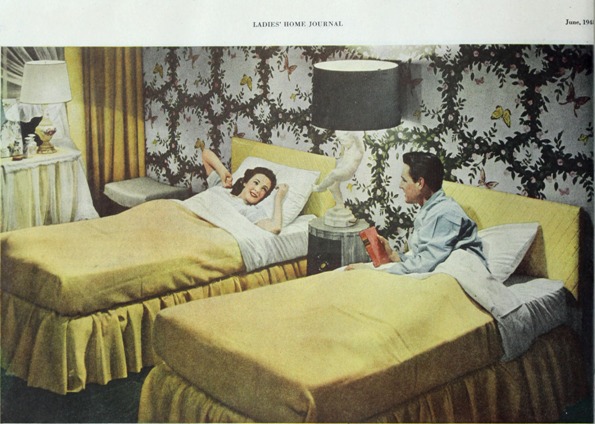
Remember the old sitcoms like “I Love Lucy,” or more recently, “Home Improvement,” where they portrayed the hubby being in the “doghouse” and getting relegated to the couch for the night?
These scenarios often showcased the husband lying, or doing something wacky behind the wife’s back, only to get kicked out of bed. My guess is that most couples have experienced something similar to this. I know I’ve been kicked out of bed a few times.
Here’s the breakdown of how this usually happens: One person does something the other disapproves of and that person is so annoyed by it that they ask their partner to sleep anywhere else for the night. The tension that builds from irritation and frustration forces the couple to create space under conditions of conflict, rather than love. Thus, alternative sleeping arrangements are hastily created.
This rarely happens peacefully and is fraught with blame, shame, and suffering.
As we all know, arguments usually have little to do with the circumstance at hand. They are symptoms of something else happening under the surface.
Many other issues may be the instigator of an argument. Some common examples are codependency (diffused personal boundaries), transference issues, poor communication, unexpressed frustrations, insecurities, or poor self-care practices.
Each of these things has one noteworthy thing to consider: none of them are personal.
When one, or both people, take things personally, everything goes south. A battle ensues. But, there are many ways that couples can improve the quality of a relationship and combat the temptation to take things personally.
Practising compassion and appreciation, NVC (non-violent communication), consistent self-care practices, regular intimacy, and taking time to reflect, are all important ways of supporting a quality relationship.
There is another beneficial practice for maintaining a healthy relationship that is quite controversial and rarely practiced as far as I can tell. I say “controversial” because it’s rarely well received and is often initially resisted when I recommend it to my clients and friends.
Ready for it?
Sleep alone at least half of the time. This prescription can be a tough pill to swallow at first.
Here’s why it works:
Deep, restorative sleep is one of the most important things we require to support a healthy mind and body. It plays a vital role in our overall well-being.
Think about how you feel when you don’t get quality rest. Are you present? Are you as patient as usual? Are you more apt to overreact? Does your mind feel clear and balanced?
When we sleep next to someone else, our quality of sleep is impacted—and not in a good way.
Our minds and bodies are busy machines that are constantly processing thoughts, memories, emotions, food, and hormones. These processes don’t shut off when we sleep. In fact, sleep is the most productive time for them.
Creating the best possible environment for sleep is imperative to our well-being.
A good sleeping environment is quiet, dark, relaxing, and comfortable. Ideally, it’s a space where little else takes place other than sleeping and lovemaking.
Most importantly, it should be a place where you sleep alone. Sleeping in your own sacred space provides a better opportunity for your energetic and physical body to do what it needs to do without interference. Sleeping next to someone else complicates things on different levels. As we practice sleeping alone, we discover that we wake up physically and emotionally sound, and feel more rested.
This is an invaluable side-effect for intimate relationships.
It’s challenging enough to navigate healthy boundaries during our waking life. The more time we spend with someone, the more we’re susceptible to being deeply conditioned by them without realizing it. Not all conditioning is bad. However, constantly taking on our partner’s energy isn’t an ideal way to live, and can take us further away from our own inner guidance system.
Sleeping alone gives us a chance to recover and restore our creative life force. The more we sleep alone, the more we wake up as ourselves, unfettered by our partner’s processes.
This practice provides a necessary break from engaging with our lover and gives us opportunities to consciously create space, rather than unconsciously forcing space through conflict.
I recommend taking baby steps and starting with just one or two nights a week as an experiment.
Pay attention to how it feels. It may feel strange at first and your body may need some time to adjust and de-condition from its attachment to your partner’s body. No matter how challenging you find it at first, I encourage you to persevere until you start to experience some of the benefits.
So, enjoy your cuddle and lovemaking sessions to your heart’s content, then skip on over to your own sacred sleep space.
It may just save your failing relationship—or take your already great one to a whole new level.
~
Author: Diana Matlack
Image: Wikimedia Commons
Editor: Lieselle Davidson








Read 29 comments and reply